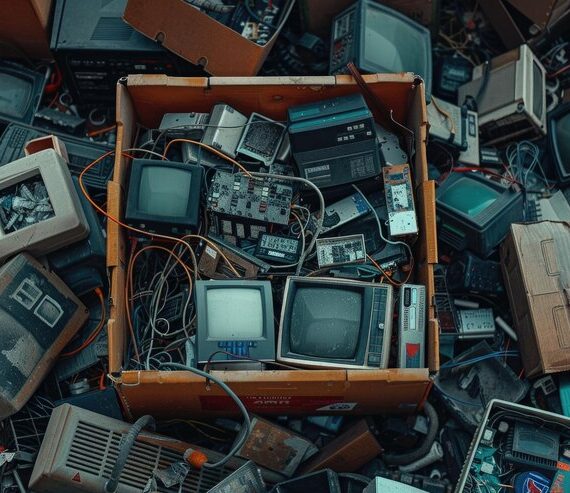
What Are The Security Risks of Improper E-Waste Disposal?
What happens to your old smartphone when you upgrade to the latest model? What about that outdated laptop sitting in your closet collecting dust? Have you ever wondered about the fate of these discarded electronic devices? While throwing them in the trash may seem simple, the reality is far more complex and potentially dangerous. Improper e-waste disposal can seriously affect the environment and our security. Welcome to our blog, where we discuss the security risks of improper e-waste disposal. Let’s get started!
Discover the potential risks of improper electronic waste disposal-

Data Breaches: When we throw away our old phones or computers, we might forget that they store important things like our personal information, photos, passwords, and bank details. If we don’t delete all this information before getting rid of the device, it can get into the wrong hands, and they can use it to pretend to be you, steal your money, or even spy on your work.
To protect yourself from data breaches, always remember to securely erase all data from your devices before disposing of them. Utilize data-wiping software or physically destroy the device to ensure no one can access your personal information. It’s better to be safe than sorry when it comes to protecting your sensitive data.
Cyber Espionage: Sometimes, when governments or businesses throw away old computers or phones, they don’t think about the secrets stored inside. These secrets might be really important, like how to make new inventions or how to keep our country safe. This sensitive data can easily fall into the wrong hands without proper measures. It could allow cybercriminals to exploit vulnerabilities and violate security protocols, potentially causing significant harm to national interests and businesses. Organizations and individuals must prioritize secure e-waste disposal methods to guard against the growing cyber espionage threat.
Identity Theft: Our phones and computers know much about us – like where we live, our friends, and even our secrets. If we don’t erase everything before throwing it away, someone could find our old devices, take our personal information, and pretend to be us. They could steal our money, open accounts in our name, or do other bad things without us even knowing.
Therefore, it’s important to always wipe and clean our devices before getting rid of them to protect ourselves from identity theft. Deleting files is not enough – we need to reset to factory settings or use specialized software to erase all data completely. By taking these precautions, we can safeguard our personal information and prevent it from falling into the wrong hands.
Supply Chain Vulnerabilities: When we throw away old electronics, we might not realize that some parts could still be useful. People might find these parts and try to sell them again, even if they’re not good anymore. It is dangerous because the new things made with these old parts might not work well or even be dangerous. Plus, bad people could sneak viruses or other bad stuff into these new things and cause even more problems for everyone.
It’s crucial for companies to have strict policies in place for properly disposing of old electronics to prevent these supply chain vulnerabilities. The risk of faulty or dangerous products entering the market can be greatly reduced by ensuring that old parts are securely destroyed and not resold. Additionally, implementing thorough security measures during manufacturing can help prevent malicious software or hardware insertion into new products. Overall, being vigilant about supply chain vulnerabilities is crucial for maintaining the safety and integrity of electronic devices.
Final Say!
The improper disposal of electronic waste poses significant security risks. By adopting sustainable e-waste disposal practices and promoting awareness about the security implications, we can overcome these risks and contribute to a safer and more sustainable future. Let’s take proactive measures to safeguard our data and protect the environment by responsibly managing our electronic waste.
Read Our More Blogs:
How to Develop a Sustainable E-Waste Management Plan for Your Business?
What are the challenges and opportunities for businesses under EPR?
Follow us:







